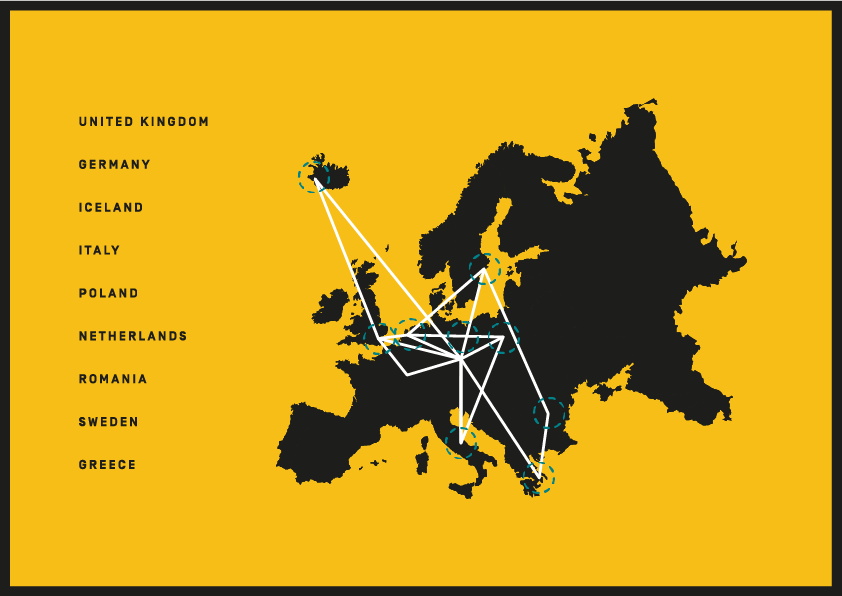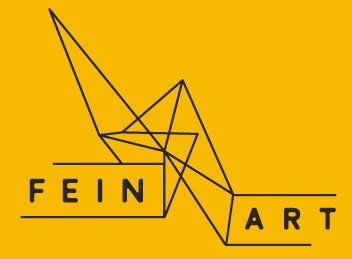FEINART
The Future of European Independent Art Spaces in a Period of Socially Engaged Art
Launch of new international training programme with participation of Biennale Warszawa
The Future of European Independent Art Spaces in a Period of Socially Engaged Art (FEINART) is an ambitious Innovative Training Network supported by the Marie Skłodowska-Curie Actions of Horizon 2020 and led by the University of Wolverhampton, committed to providing high quality training for 11 Early Stage Researchers (ESRs) to complete PhDs in the area of art and social engagement. The network covers four Beneficiaries (University of Wolverhampton, UK – Project Coordinator; University of Edinburgh, UK; Zeppelin University, Germany; University of Iceland, Iceland) and seven Partner Organisations (Tensta Konsthall, Sweden; BAK, Netherlands; State of Concept, Greece; W-Est, Italy; Tranzit.ro, Romania; Biennale Warszawa, Poland; and Iceland University of the Arts, Iceland).
Socially Engaged Art aims to create social and political change through forms of interdisciplinary collaboration and exchange between artists, individuals, communities, and institutions, the emphasis being on learning-through-participation and collective research.
This the first EU funded network to provide a wide range of interdisciplinary training programmes for the independent development and production of social engaged art in Europe. It therefore represents a major opportunity for new research into the support and dissemination of socially engaged art with important implications for the future public funding of the independent arts sector. Thus, the training programme will provide an extensive critical analysis and data about the contemporary role, impact, and distribution of socially engaged art as the basis for funding-policy recommendations for the support of art’s production and display beyond the museum’s traditional functions; and, as such, provide an invaluable debate on art, democracy and the public sphere.
Successful candidates will undertake a 3-year PhD programme in socially engaged art and the interdependent art sector, in one of three following interdisciplinary-based subject areas: art and political philosophy; curatorial studies/arts administration, and art theory and practice. These programmes will provide a comprehensive range of academic and non-academic research and managerial skills.
Given the COVID-19 crisis and the uncertainty about travel, we decided to extend the recruitment deadline until the 31st August.
More details: http://feinart.org
Research Programmes
FEINART’s interdisciplinary programme across art and political philosophy, curatorial studies/arts administration, and art theory and practice, provides a rigorous methodological framework to address the challenges of the contemporary cultural landscape of socially engaged art across Europe. Thus, the intersection of each of the three research areas is crucial to the synoptic and analytic demands of the project overall, for one discipline necessarily draws on the skills and insights of other disciplines. That is: new forms of democracy and policy making are inseparable from new social forms of art and new artistic skills, just as questions of the social forms of art are inseparable from the role of the curator and his or her collaboration with the artist; and in turn, the role of the artist and curator and the creation of new social forms of art are inseparable from the development of new publics and the creation of new institutions. FEINART, then, will enable a fluid and flexible working relationship between the Beneficiaries as centres of critical research in the areas of art and political philosophy, curatorial studies/arts administration and art theory and practice, and the POs as centres of excellence in the development of socially engaged practice (providing a wide range of practical and practical-theoretical training).
More details:http://feinart.org/esr-programs/
Call for Applications
Given the COVID-19 crisis and the uncertainty about travel, we decided to extend the recruitment deadline until the 31st August.
Successful applicants will receive a full-time employment contract with a competitive salary for 36 months. The remuneration of the recruited ESR is based on a monthly payment made up of a living allowance and mobility allowance and, where applicable, a family allowance, and according to MSCA Horizon 2020 requirements. Please note: the exact (net) salary will be confirmed upon appointment, depending on local tax regulations, country correction coefficients, and local currency.
Eligible candidates should:
- Hold a Master’s degree in the fields of art history, philosophy, curating, arts administration, social science, artistic research/practice or cultural studies; MA degrees in alternative relevant fields may be considered.
- Not have spent more than 12 months in the country of the hosting Beneficiary in the three years immediately before the employment start date.
- Be an Early-Stage Researcher and must, at the date of recruitment by the beneficiary, be in the first four years (full-time equivalent research experience) of their research careers and have not been awarded a doctoral degree. Full-Time Equivalent Research Experience is measured from the date when the researcher obtained the first degree entitling him/her to embark on a doctorate (either in the country in which the degree was obtained or in the country in which the researcher is recruited), even if a doctorate was never started or envisaged.
- Have good verbal and writing skills in English (IELTS overall score of 7.0, or TOEFL overall score of 100).
- Be highly motivated and have a personal commitment to the success of the research project as a whole.
- Demonstrate an excellent understanding of artistic practice in a social and political context and/or in relation to political philosophy.
- Demonstrate experience in studying in one or more of the following fields of research: art and political philosophy, curatorial studies/ arts administration, and art theory and practice.
- Possess a willingness to travel and to attend the FEINART programme and training activities.
- Have a commitment to work in a team and have an aptitude to meet challenges.
- Demonstrate an excellent understanding of the ethical requirements involved in working with others in the field of social and artistic research.
Salary
Successful candidates will receive a 3-year full-time employment contract. As per MSCA regulations, the salary includes a living allowance of €3,270 per month (gross amount) to be paid in the currency of the country where the host organisation is based, with a country correction coefficient to be applied; a mobility allowance of €600 per month; and a family allowance of €500 per month (depending on family situation). Please note: the exact (net) salary will be confirmed upon appointment, depending on local tax regulations, country correction coefficient, and local currency.
How to Apply
Applicants should follow the guidelines below. All documents should be submitted in English.
1. Applications must be submitted online through the website of each host university where the ESR project is based.
2. A proposal of 2500 words that demonstrates your research interests for the planned PhD training programme and how you envisage undertaking the research project (including a time schedule and a bibliography). The proposal must provide a clear theoretical framework of research within the given parameters of each project (a maximum of two research proposals from the 11 projects offered can be submitted).
3. A CV including a description of your professional background, indicating clearly that you are in the first 4 years of your research career, that you do not hold a doctorate, and have not spent more than 12 months in the three years immediately prior the project recruitment date, in the country of the Beneficiary you are applying to. As such, the CV must specify your country/countries of residency over the last three years. Successful candidates will be required to provide a copy of their Master’s Degree in English, prior to employment.
4. The names of two referees (only the referees of successful candidates will be contacted)
5. Candidates will be shortlisted in July and interviews will take place in September.
The FEINART project is committed to adopting to a fair, open & transparent recruitment process adhering to equal opportunities and the Commission Recommendation on the European Charter for Researchers (https://www.euraxess.at/sites/default/files/am509774cee_en_e4.pdf), the Code of Conduct for the Recruitment of Researchers (https://euraxess.ec.europa.eu/jobs/charter/code) and to the principles of the Athena Swan Charter (https://www.ecu.ac.uk/equality-charters/athena-swan/).
The successful candidates will start in October/November 2020 (changes may occur to the mentioned timeline due to current ongoing Covid-19 outbreak).
Please note that all applications received will be retained on record by the beneficiaries (University of Wolverhampton, University of Iceland, Zeppelin University and University of Edinburgh) for audit purposes up to 5 years after the end of the project. Therefore, by applying candidates agree to have their data stored and processed for this length of time.
More details: http://feinart.org/esr-recruitment/


